Immerse yourself in the vivid world of Sumi Haleem and her eco-conscious swimwear brand, Funoas, as we dive into an inspiring narrative featured in House of Coco magazine. From the crystal-clear waters of the Maldives to the global stage of sustainable fashion, Sumi shares her journey of intertwining art, culture, and environmental advocacy.
Discover how Funoas has become a symbol of change, leading the way in eco-conscious practices and influencing a movement for a more sustainable future. Join us in celebrating Sumi Haleem’s dedication to reviving her ancient culture and leaving a legacy that transcends the shores of the Maldives…
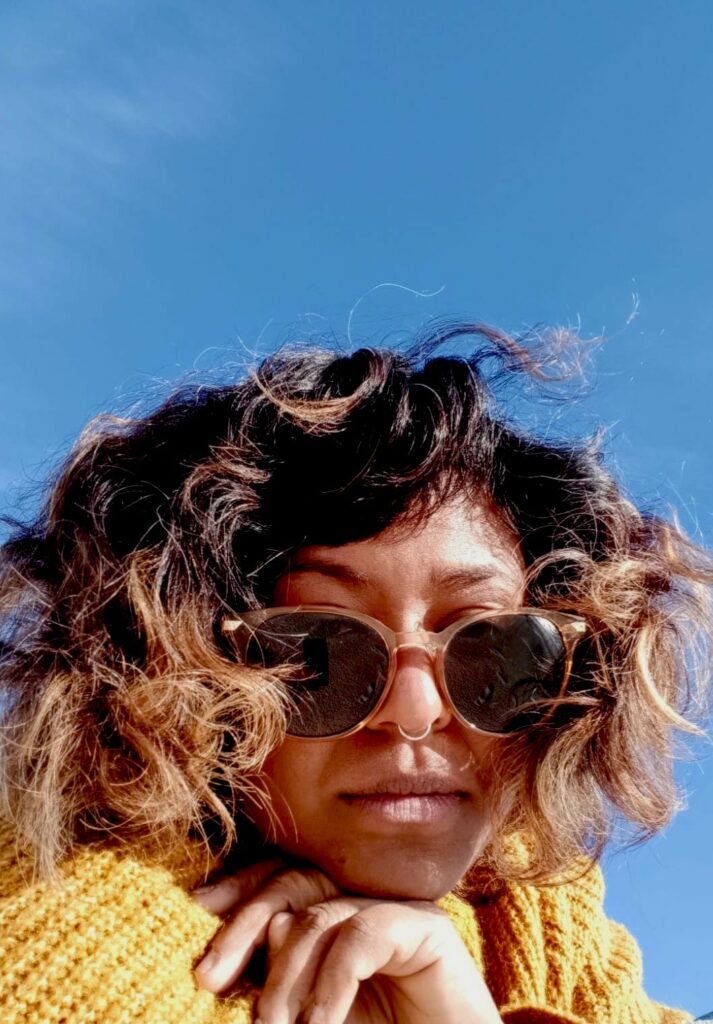
Sumi, can you take us back to the moment when you first started scuba diving in 2014? How did that experience influence your perspective on the Maldives’ coral reefs and the environment?
When I first started scuba diving, I fell in love with the whole process of submerging myself under the sea, amidst the coral reefs, as an observer of this extraordinary alien world. I was obsessed with capturing the weird and wonderful sea creatures, their movements, and behavior. I was just completely fascinated by all of it.
My experience as a diver made me truly understand and appreciate the deep-rooted connection between myself, as an islander, and the coral reef systems. As a Maldivian, our livelihood and culture are shaped by the coral reefs, almost like a symbiotic relationship where one depends on the other for survival, especially now in the wake of climate change.
The beauty and vulnerability of coral reefs inspired you to create Funoas. How did you decide to translate that inspiration into an eco-conscious swimwear brand, and what were the initial challenges you faced?
I wanted to create awareness about the very real climate crisis that our island nation faces; we might disappear within the next 100 years. I am not a marine scientist, and the only way I knew how to tackle this problem was through art. Being an islander, the ocean is a core part of my identity, and I wanted to share my experience and my culture while creating a space to discuss environmental issues. So, I started Funoas, a slow fashion swimwear brand where the fabric designs are derived from our unique culture and the vibrant patterns of the islands’ coral reefs.
When I started 8 years ago, as a startup small brand, sourcing sustainably and ethically produced fabrics was very expensive and hard to find. As a slow fashion brand, it was important for me to make sure that every aspect of production was conducted in a way that had the least impact on the environment, from the dyeing process to the packaging. That was the most challenging part of the initial setup for Funoas because there was very little transparency in the manufacturing process. Things have become a lot more transparent and accessible since then.
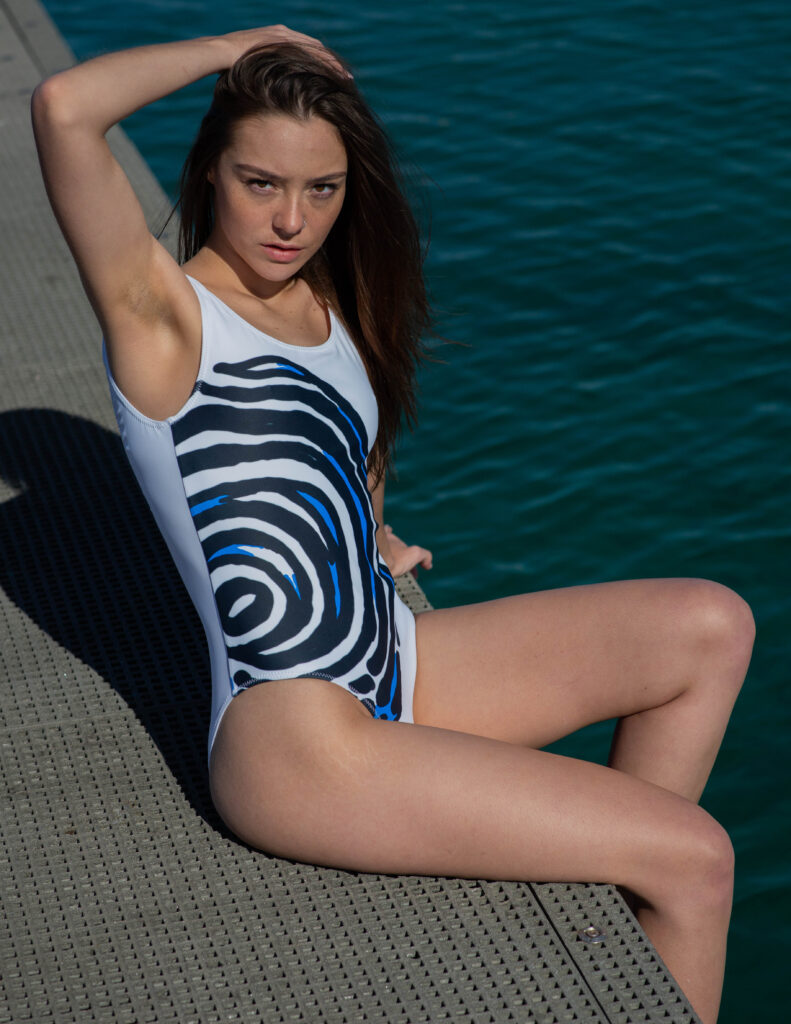
As a Dhivehi artist and textile designer, how did your background and artistic skills shape the unique patterns and designs of Funoas swimwear, reflecting the rich indigenous heritage of the Maldives?
Our culture is completely entwined with the ocean, creating a very unique way of life for us. As a Dhivehi woman, I wanted to share our story and our culture that has shaped our lives for thousands of years. I was raised by my maternal grandmother, who is from the Maizan clan. The Maizan family is predominantly artists, artisans, and designers, so everything I know about art and design has been passed down to me from my grandparents, aunties, uncles, and cousins, all of whom are influenced by the Dhivehi way of life.
I also use my photography from the dives as a reference to create the prints using watercolor and mixed media. I think that the bold, colourful prints of Funoas swimwear very much reflect that sense of identity present in people of the sea.
Funoas is not just a swimwear brand; it’s a platform to spur discourse on climate change and the fragility of the Maldives. How do you envision your brand contributing to this important conversation?
Whenever I tell people I am from the Maldives, they automatically assume shiny, happy islanders sipping cocktails in luxury water bungalows, which is very much not true for the local people like myself. Through Funoas, I am able to start conversations about how global warming and sea-level rise are displacing our people and destroying the coral reefs. This is one of the main reasons I use patterns derived from sea creatures, so when people wear our swimwear, it is a reminder of the beauty and vulnerability of my island home.
Funoas is a great way to put our feelers out for collaborations with other artists and environmentalists to make a difference. We have collaborated with local and international artists, freedivers, environmentalists, and recently in the fashion industry. I am also very much interested in promoting slow fashion.
In the third world, it is near impossible to make sustainable brands because people can’t afford it. It is so much more affordable to purchase from fast fashion brands than to wait for an expensive print-on-demand piece. Through Funoas, I want to promote and practice the concept of recycled fabrics, upcycling old clothes, made-to-order clothing business models because we need to change the mentality to slow down the growing climate problem.
Sourcing sustainable and ethical materials is a key aspect of Funoas. Can you share some insights into your process of finding and utilizing these materials, and the impact it has on the environment?
When I first started Funoas, I spent a lot of time doing extensive research on different types of textiles and the yarn used to weave the fabrics. I found ECONYL, and they made recycled polyester which can be used to make swimwear. So, I found a factory that used these fabrics and also printed using the dye sublimation technique, which uses almost no water and is machine-operated. I made leggings and board shorts also from the same company based in Hong Kong.
This process was very tedious and time-consuming, and being Funoas being a one-woman show, it was extremely challenging, especially during COVID-19. During COVID-19, I was forced to change my business model to online to keep it afloat. This was actually a blessing in disguise because it opened this pathway to a print-on-demand business model. This model is very automated, and a lot of little companies were running the print-on-demand manufacturing.
This was a tipping point for Funoas in sustainability and ethical manufacturing because all our products were now made to order and no dead stock was ending up in landfills. Also, our swimwear is now manufactured in Europe where strict ethical codes and sustainability guidelines have to be met. The company I work with for Funoas is very focused on sustainability from having a transparent manufacturing process to packaging. I think going print on demand drastically reduced our carbon footprint as a company. We also use Squarespace as our host for our website, which is working towards using 100% renewable energy.
Starting a business is never easy, especially one with a strong ethical and environmental focus. What were the defining moments that kept you motivated during the early days of Funoas?
When I first started, I did not see Funoas so much as a business but more as an expression of myself and my identity. It was a way for me to process my scuba diving experiences and my beliefs. For me, Funoas is a way of doing my part in creating noise about the problems faced by my people and our islands.
Since then, we have grown both in popularity and as a business, so things have definitely become more serious since the early days. It is definitely a growing business now, but my core values for Funoas still remain the same and I think this is what motivated me then and still does now. Funoas is and always will be a labor of love.
The vibrant patterns in Funoas swimwear reflect the beauty of the Maldives’ coral reefs. How do you hope these designs will connect people to the environment and encourage a greater sense of responsibility?
I think us as human beings are very much an “out of sight, out of mind” sort of species. What we don’t see, we tend to forget which is why littering in the ocean is a big problem. We don’t see the vast marine ecosystem that we are hurting when we throw ghost nets and plastic bottles into the sea. When someone wears Funoas swimwear, the textile prints represent a beautiful sea creature that lives in this marine ecosystem.
It makes the wearer of the product think about the animal and therefore makes a visual connection, a gentle reminder to be respectful to those incredible animals that live in these intricately woven coral reefs. The hope for us is that through wearing these representations of Maldivian coral reefs, people can develop a sense of responsibility to care for the delicate coral reefs and everything that feeds off them, including the Dhivehi people.
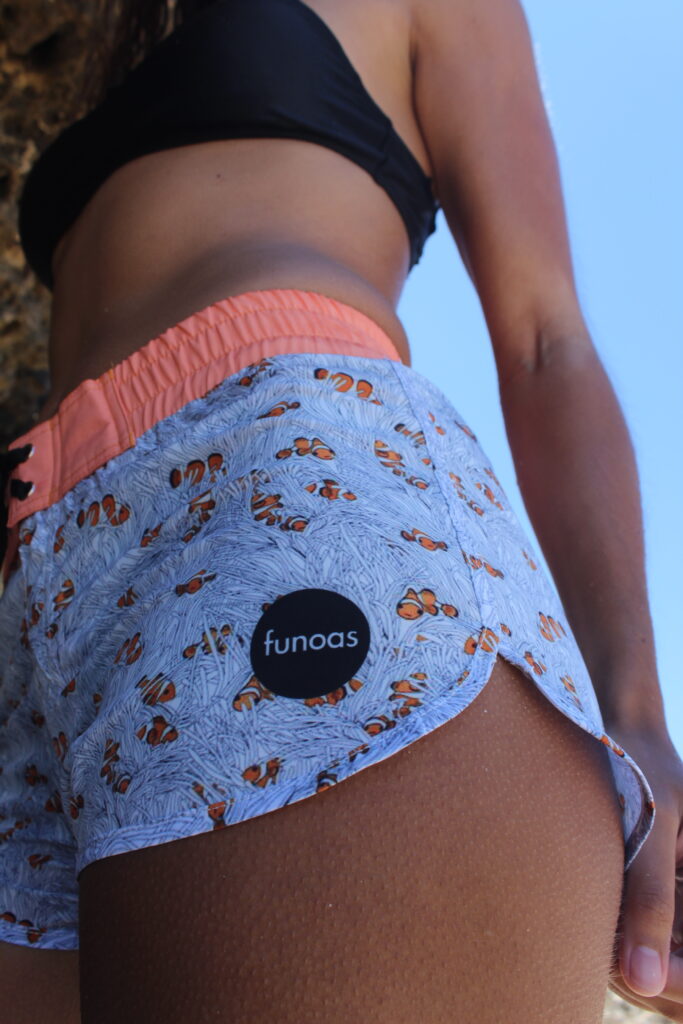
Being the first eco-conscious swimwear brand from the Maldives is a significant achievement. What message do you hope Funoas sends to the fashion industry and consumers worldwide?
Our message is to say that it is very possible to start a slow fashion, environmentally friendly brand even if you are a small, self-owned startup like Funoas. The challenges and obstacles are there, and we still have a lot of work to do to make every single Funoas product 100% eco-friendly. The fast fashion industry must be abandoned to restore the health of Earth, and we want to encourage other small brands to also go eco-friendly. This is our message to the fashion industry and consumers worldwide.
Funoas was born in 2016. Looking back, what milestones are you most proud of, and how have they shaped the brand’s journey?
I am most proud of one particular design that was in our first collection. The Thaana print is one that still resonates with Maldivians and people who have lived in the Maldives. We have a unique language and writing system called Thaana Akuru that is only spoken and written in the Maldives and previously in the Laccadive islands (was a part of the Maldives in ancient times). Our Thaana design is a scatter of the letters and vowels against a black background. I think this piece brings a sense of belonging to Maldivians and nostalgia to anyone who is familiar with these letters.
It is still our most popular print. Being featured in British Vogue for the 2023 summer campaign was a huge deal for Funoas and myself as a designer. I am not one who is particularly interested in accolades, but this was a defining moment for me as a designer. I did a collaborative project with a local designer Assadh Thaufeeg and his father who was a traditional Koari maker. Koari is the traditional fisherman’s hat that we have worn from ancestral times.
It was first made using palm leaves, then with cloth but due to westernization, this hat was slowly fading away amongst the younger Maldivians. By collaborating with the artisans through Funoas, I was able to revive this motif and bring it back into the modern world. We sold out in one day, and that made me realize how much this piece resonated with people, old and young. I also realized how much we subconsciously crave for our Dhivehi-ness. I am quite proud of this project and hold it very dear to my heart.
How do you balance the cultural elements of the Maldives’ heritage with modern sustainable fashion trends in your designs?
Maldives has changed a lot over the past couple of decades, from when I was a child. Almost everyone now speaks English, and a lot of Maldivian children don’t speak Dhivehi language. Along with language, our island lifestyle is also changing to a metropolitan one. I have this sense of urgency to capture elements from our Maldivian heritage that are disappearing. I thought the best way to keep the young people interested in our old ways of life is to create a fusion between then and now.
The Koari fisherman’s hats really worked out in this way where we infused modern bright bold Faana fish print with the traditional fisherman’s hat design. I also like to make capsule collections that are limited editions. As our products are never mass-produced, this works well with popular designs because it is only available for a given period.
We have a Newspaper design that is a collage of historical events that took place in the Maldives, that people have started to forget. We always make limited edition capsules with this design, and it starts trending, without mass production and having dead stock ending up in landfills.
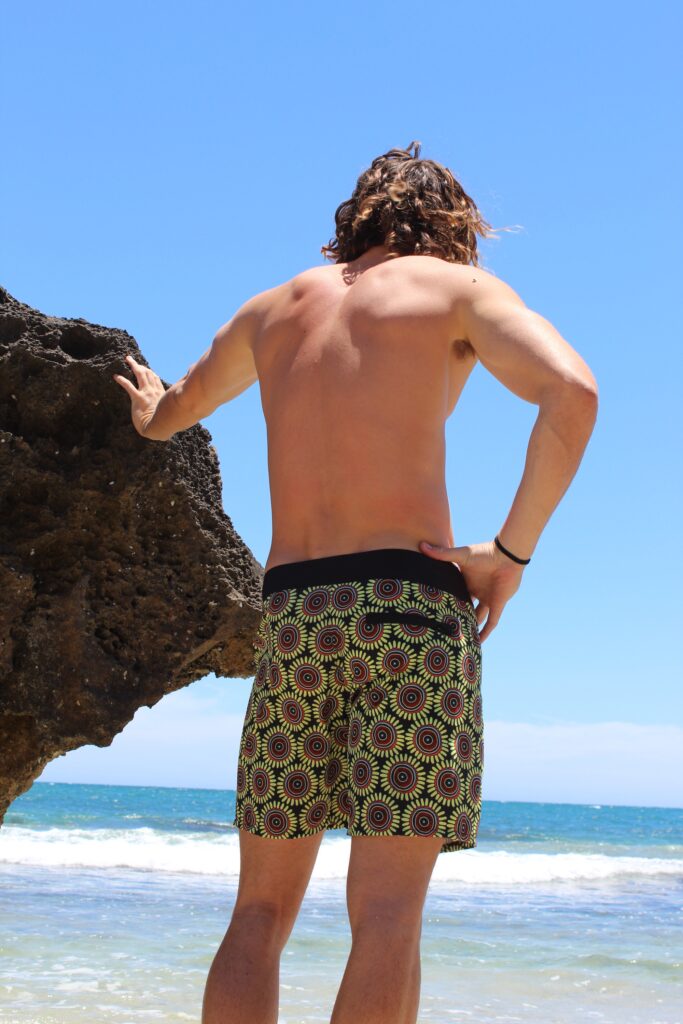
Can you share a specific story or moment when you felt the impact of Funoas on raising awareness about climate change and environmental issues?
A few years ago, we made reusable bamboo coffee cups with Funoas designs on them. At the time, this was a very new concept in the Maldives, and people did not catch on to the idea. We sold only a few cups, and the rest were sitting in a room, and I had scrapped it off as a loss. The government banned single-used plastic a year after I released the cups, and there was a sudden spike in the popularity of the reusable cups. We sold out, and everyone was using it.
Other brands also started bringing in different styles of reusable cups. We also collaborated with a local environmental agency, SIGS Maldives, and did giveaway challenges. I think that was a moment that Funoas was able to deliver a message and make a positive change, a little change but it is something I like to hold on to as making a difference in society.
Your journey involves intertwining art, fashion, and environmental advocacy. How do you see the synergy between these elements creating a unique identity for Funoas?
The beautiful thing about art and fashion is their ability to draw attention and deliver a message in a boundless space. I genuinely believe the best way to reach out to people or get yourself heard is through art, be it painting, writing, music, or dance and not through structured institutional and bureaucratic measures, which are showing to fail, especially with the growing presence of the internet.
I try to make designs so that they are bold, contrasting, and eye-catching patterns. When someone wears a Funoas product, it draws attention to the outfit. This will automatically drive people to discuss the designs and the conversation about our message of climate change can begin. Once that conversation starts, the opportunities to make a difference are available to everyone participating in the conversation. This is the aim of Funoas, to create a talking point for the bigger issues using wearable art.
As the founder, how do you cultivate a culture of sustainability and ethical practices within your brand, ensuring alignment with your core values? Whenever possible, I prioritize the use of ECONYL fabrics for Funoas swimwear, rash guards, and board shorts.
In terms of sustainability, staying informed about the latest innovations is crucial, as new products are continually emerging. Funoas, an extension of myself, mirrors the way I live my life. Ethically, I collaborate with a manufacturing company that adheres to a strong ethical and sustainable model for our print-on-demand/dropshipping online store. Additionally, Funoas’s website is hosted by Squarespace, which operates data centers using 100% renewable energy to run their servers.
When stocking products in the Maldives, I ensure that resorts or local shops align with Funoas’s ethos. We predominantly collaborate with local shops to support small, family-owned Dhivehi businesses.
The Maldives faces unique environmental challenges. How does Funoas contribute to the broader conversation on climate change and inspire positive actions? We engage in collaborations with local artists and NGOs, creating designs and products that raise awareness about the challenges faced by the Maldives. For instance, we are currently developing a product with the local environmental group Save the Beach, aiming to restore coral reefs damaged during land reclamation.
All profits from the sale of the product will directly support the Save the Beach NGO, encouraging both Maldivian and international communities to actively participate in the broader conversation through positive actions.
In what ways do you engage with local communities and artisans in the Maldives to ensure that Funoas remains deeply connected to its roots?
The Maldives’ primary economy is tourism, and Funoas ensures its products are sold in local islands, collaborating with small, locally-owned businesses to distribute our swimwear and other products. Our favorite approach involves working with various local artists and artisans, granting them creative freedom when developing product concepts and providing a significant percentage of profits from sales. This approach helps regenerate culture at an individual level and facilitates sharing it with others.
The global fashion industry is undergoing a sustainability transformation. How does Funoas lead by example and influence other brands to adopt eco-conscious practices? From its inception, Funoas has embraced sustainability as its motto, laying an eco-conscious foundation for future Maldivian brands. We hope to inspire up-and-coming brands to adopt similar ethos while constructing their brand models.
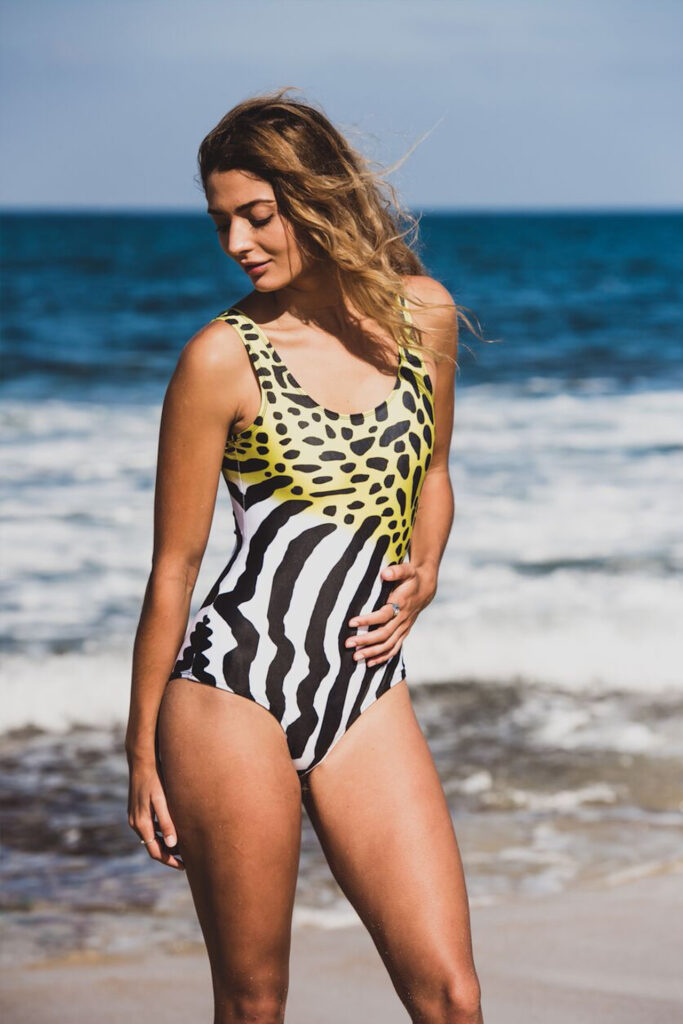
Funoas is not just a product but a movement. How do you engage your customers in this movement, making them active participants in the mission for a more sustainable future?
Funoas is not solely profit-driven, and by remaining true to our message, we’ve organically attracted an incredible group of like-minded individuals worldwide. Staying authentic in designs and art naturally resonates with customers, drawing them into the movement.
Looking ahead, what are your aspirations for Funoas in the next five years, both in terms of business growth and environmental impact?
Business-wise, I aim to expand further within the Maldives, working on projects based in the country. We also aspire to collaborate with international and local environmental groups on new products that contribute positively to the planet’s future.
As a female entrepreneur and environmental advocate, what advice do you have for aspiring individuals who want to create a positive impact through their ventures?
My biggest advice is to act on your vision or idea without spending excessive time trying to perfect it. Launch that product, take the first step, and get started. The most crucial aspect is to begin. With determination and authenticity, everything will align naturally. Also, be open to criticism from various perspectives; this will enable you to think outside the box and make necessary changes for the better.
Funoas has become a symbol of eco-conscious fashion from the Maldives. What legacy do you hope to leave with your brand, and what do you want people to remember about the journey of Funoas and its founder, Sumi Haleem?
I haven’t deeply pondered Funoas in this light because I believe there are still many ideas to be fulfilled through my art and design process. Currently, I see myself at the initial stages of something more significant than it is now, making it challenging to answer this question. For now, I want people to remember me as someone attempting to revive and restore her ancient culture and heritage through art and design, in the way she knows best, before it is too late.

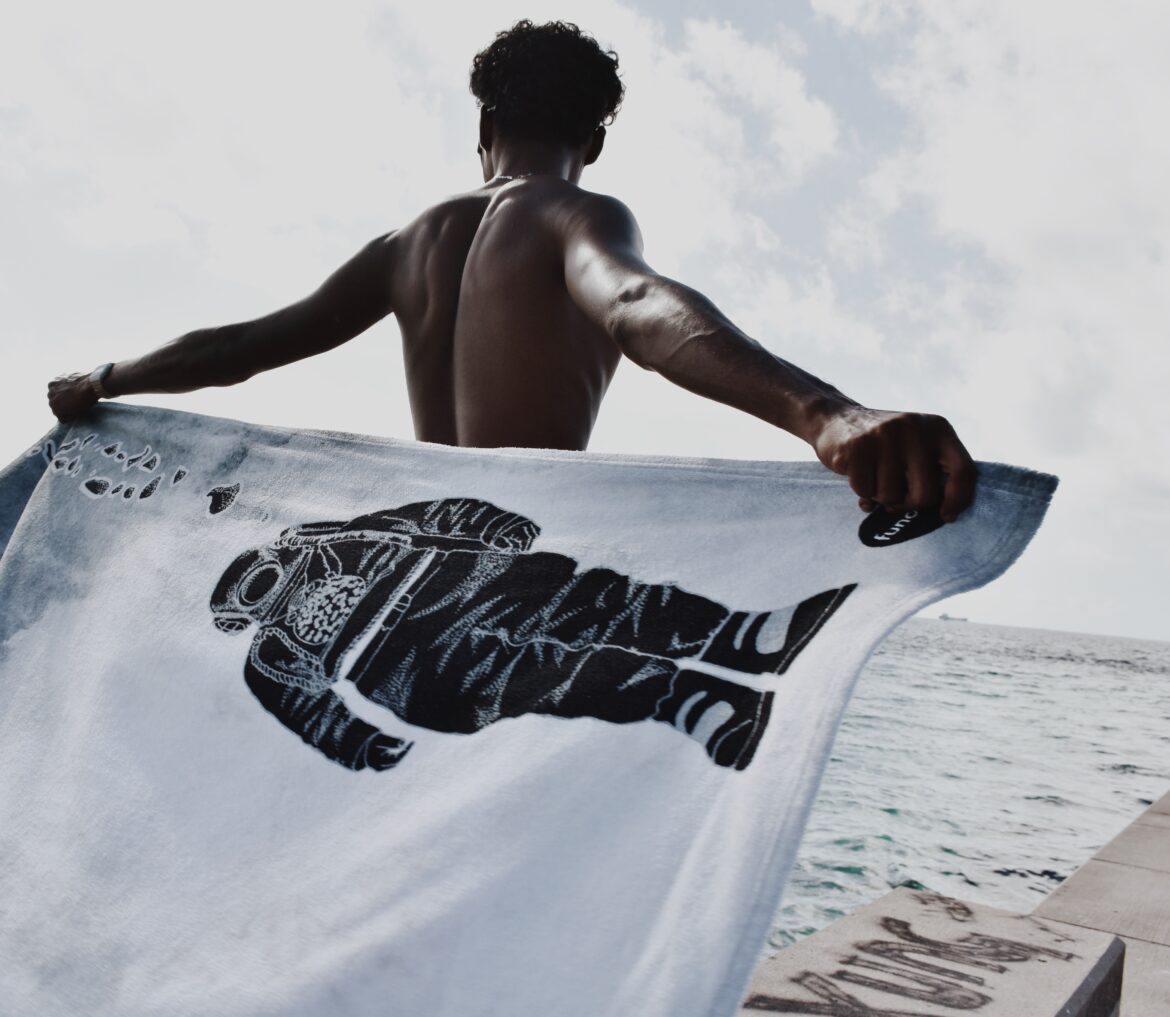


Comments are closed.